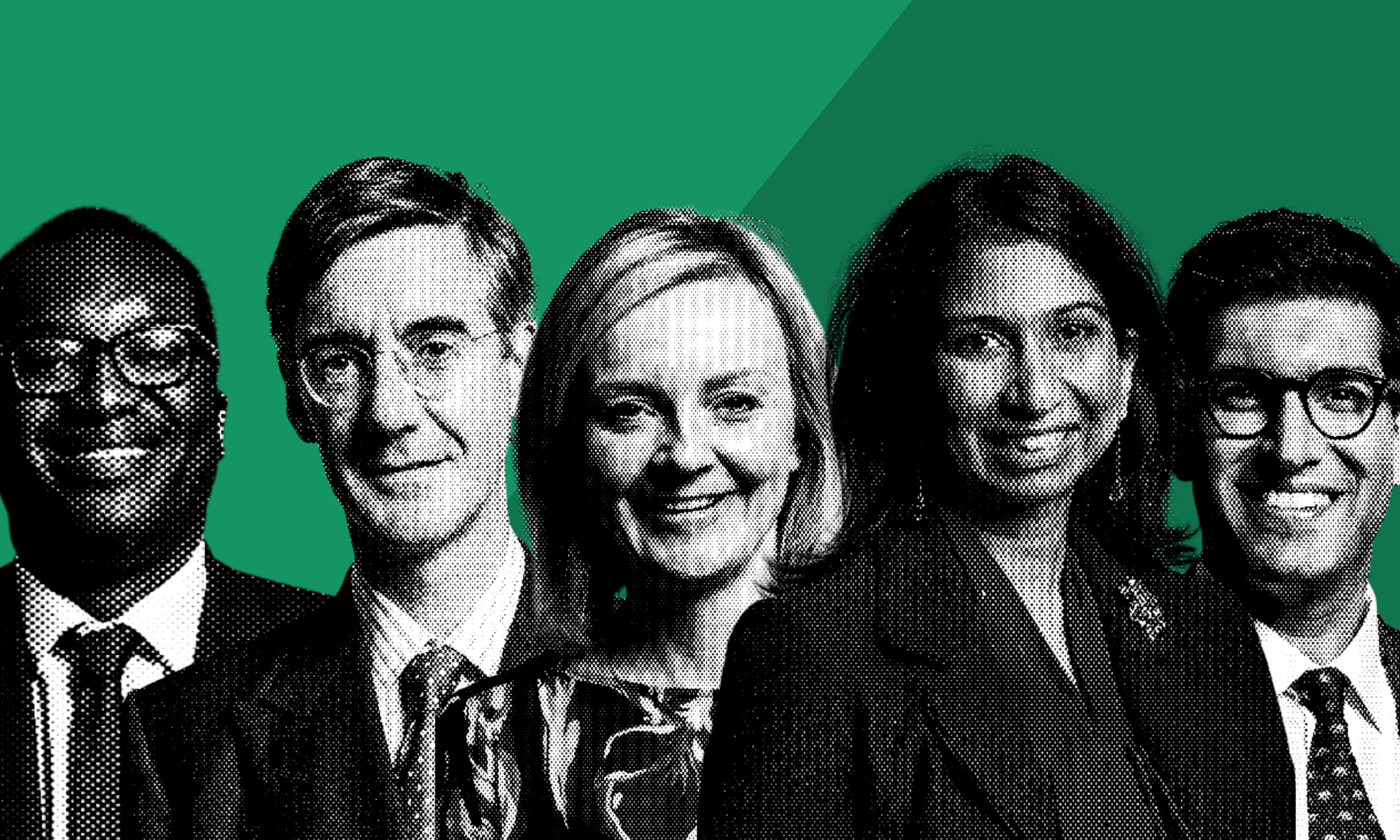
Wikimedia Commons
Where do new members of the Tory cabinet stand on climate?
Britain’s climate deniers are not on the fringes, they’re in the cabinet.
DiyoraShadijanova and Editors
13 Sep 2022
Seas full of shit, broken temperature records, a nationwide drought, ruined crops, trillions of litres of water lost in leaky pipes, the fracking ban lifted and an energy crisis. The UK is experiencing a deluge of political crises compounded by greedy governance and a fast-deteriorating environment. With every new Tory government inching rightwards, the party’s politicians are happy to sacrifice our lives and habitats by voting through regressive policies. But are things about to get a whole lot worse?
After examining the climate voting history of the entire new Tory cabinet (via the website TheyWorkForYou), gal-dem can report that every single person has either generally or consistently voted against climate change measures. Surprisingly, while some of the cabinet members had expressed that climate change is man-made and an urgent issue in press interviews or online, they still voted against any mitigation or adaptation policies, and often looked to unviable solutions such as carbon capture.
The most worrying appointment is Jacob Rees-Mogg as business, energy and industrial strategy secretary. The climate denialist will now oversee the government department responsible for energy and climate change. Climate organisers are deeply worried about what this will mean for the UK.
“Putting someone who recently suggested that ‘every last drop’ of oil should be extracted from the North Sea in charge of energy policy is deeply worrying for anyone concerned about the deepening climate emergency, solving the cost-of-living crisis and keeping our fuel bills down for good,” says Dave Timms, Friends of the Earth’s head of political affairs. Indeed, Rees-Mogg is likely to push the idea that more fossil fuels are a solution to the energy crisis, when it is really our long-term reliance on gas and oil and inaction on energy efficiency that has sent energy bills shooting through the roof. Contrary to popular belief, and the Tory line on the energy crisis, Russia cutting off the gas supply to Europe is only a part of the problem.
The rest of the cabinet, including Prime Minister Liz Truss, will undoubtedly support more drilling for oil and gas, and more protections for energy giants swimming in profit, because of their hard-line ideological commitment to a free-market economy and the influence of powerful fossil fuel lobbies. So far, Truss has rejected support for a windfall tax, and her proposed £150 billion energy package will see tax-payers footing the bill for extortionate energy prices. Nationalisation, a measure nearly half of Tory voters support, would be political suicide for her.
Here are some of the most worrying individual track records of Truss’ newly selected cabinet, with their stances on environmental issues, the climate crisis and the fossil fuel industry:
Liz Truss – Prime Minister
You’d think someone who was environment secretary nearly a decade ago would have green ambitions as a prime minister in 2022 – a year polluters really accelerated cooking the planet. However, Truss, who once worked as a commercial manager at Shell, is on a predictable mission to dunk on sustainable energy for hard-line Tory support. Earlier this year, she called wind farms “medieval” and said solar panels are a “blight on the landscape”.
Though she’s not denied that climate change is happening, her political history shows that she is simply not bothered about it. Truss has generally voted against measures to prevent climate change. Back in 2010, she was a huge supporter of Heathrow expansion and has always strongly favoured fracking. She also has been linked to free-market groups which often veer into climate denialism.
Kwasi Kwarteng – Chancellor of the Exchequer
Our new chancellor was the secretary of state for business, energy and industrial strategy under Johnson and has been accused by Ed Miliband, Labour’s shadow business secretary at the time, of being asleep at the wheel during the 2021 gas crisis. While in the role, he dissolved the Industrial Strategy Council (the advisory body seeking to regenerate Britain’s regions), and days after COP26 in Glasgow was over, he met with oil industry bosses to encourage them to continue drilling in the North Sea.
Earlier this year, he took a trip to Saudi Arabia, a country infamous for its lack of human rights, to get wined and dined by Saudi Aramco, the majority state-owned energy company. Not only did he accept gifts upon arrival, his commercial flight cost the taxpayer nearly £5,000.
So it’s no surprise that Kwarteng has explicitly called for an acceleration of oil and gas investment to deal with the current energy crisis. Writing in April this year, he said: “That is why we took steps to remove obstacles to accelerate production and confirmed that the North Sea Transition Authority (NSTA) plans to launch another North Sea licensing round in the autumn, taking into account the forthcoming climate compatibility checkpoint and the need for domestic energy security.”
“I want to also be clear that we will not bend to the will of activists who naively want us to extinguish production in the UK Continental Shelf.”
Kwarteng has generally voted against measures to prevent climate change.
Suella Braverman – Home Secretary
The new home secretary, who ran for leader this summer, accepted £10,000 from a leading climate sceptic to support her campaign. She also argued that the UK should suspend its legally binding commitment to net zero by 2050 and blamed the energy crisis on our green commitments. This is, of course, false. The current energy crisis is due to the UK’s dependence on fossil fuels, the wholesale prices of which have surged.
Unsurprisingly, Braverman almost always voted against measures to prevent climate change.
Ranil Jayawardena – Secretary of State for Environment, Food and Rural Affairs
You’d think the new environment secretary would at least push for green policy… right? That might be the case were we to live under a logical or honest government, but not with the Tories. Jayawardena has consistently voted against measures to prevent climate change and has resisted government support for renewable energy projects.
Jacob Rees-Mogg – Secretary of State for Business, Energy and Industrial Strategy
The country’s business, energy and industrial sectors hold the key to how we tackle the climate crisis and having Rees-Mogg as the head of these strategies – who is a major shareholder and co-founder of Somerset Capital Management, a £6.9 billion investment fund with ties to the fossil fuel industry – undermines any meaningful government action towards green energy. Not only has the North East Somerset MP proclaimed that we should think about “extracting every last cubic inch of gas from the North Sea” earlier this year, he’s also a huge net-zero sceptic. He will no doubt take the line – if he hasn’t already – that the energy crisis is precisely why we should drill for more oil and gas, a claim that would only serve his own self-interests and not bring about any real changes to energy prices in the UK.
Not only has he flip-flopped between doomerism and complete climate denialism, he has also actively pushed for deregulation in UK’s industries and employment law, suggesting he wants to destroy every bit of green protection that currently exists in the country. Rees-Mogg has generally voted against every measure to prevent climate change.
Graham Stuart – Minister for Climate
On the face of it, Stuart seems like a sensible appointment. He once described climate change “one of the greatest challenges we will face in this lifetime”. However, this is a man who supports wood-pellet burning at Drax power station in Selby, which is the single biggest emitter of carbon dioxide in the country. Predictably, he’s also a fan of carbon capture, which is the climate equivalent of kicking the can down the road. Graham Stuart has generally voted against measures to prevent climate change.
Kemi Badenoch – International Trade Secretary
Badenoch has consistently voted against measures to prevent climate change. One of these votes was not to call on the government to develop and implement a plan to eliminate the substantial majority of transport emissions by 2030. During her leadership campaign, she did a double-U-turn on UK’s net zero by 2050, saying “there are circumstances” where she would delay it.
Simon Clarke – Levelling Up, Housing and Communities Secretary
If you were to go by Clarke’s website, it seems he calls for support for the environment by pushing for carbon capture and storage (CSS), which isn’t a viable solution because it’s still to be developed and set to an affordable level. CSS projects are popping up all around the world because oil and gas industries are pushing for them to keep drilling into the ground and burning fossil fuels – not to cut emissions. It’s a license to pollute.
Clarke also went on TV last week to call for more fracking. To be clear, fracking has been blamed for leaking millions of tonnes of methane, which is a greenhouse gas more potent than carbon dioxide, uses large amounts of water which becomes contaminated and affects local groundwater, and finally releases airborne hydrocarbons that cause respiratory issues.
Clarke has, of course, consistently voted against measures to prevent climate change. This includes not supporting the reduction of the United Kingdom’s net carbon emissions to zero by 2050.
James Cleverly – Foreign Secretary
James Cleverly: “Climate change is a huge global challenge.”
Also James Cleverly: *consistently voted against measures to prevent climate change*, such as banning the burning of certain types of vegetation in almost all upland areas with peat soils in England. Peatland habitats are the largest natural carbon store on UK land, locking up more than 3 billion tonnes of carbon. They help prevent floods and are home to rare plants, insects and birds.
In 2018, Cleverly voted in favour of Heathrow’s third runway and against financial incentives for low carbon emission electricity generation. A year later, he criticised the young students going on school strike for ‘Fridays for Future’.
Penny Mordaunt – Leader of the Commons
In her brief time running for leader, Mordaunt claimed she would create a “million green jobs”. But she then proceeded to take a £20,000 donation from First Corporate Consultants – a company run by Terence Mordaunt, who chaired the climate denialist Global Warming Policy Foundation. Despite sharing the same surname, the two are not related.
Mordaunt’s record shows that she has generally voted against climate policies.
Anne-Marie Trevelyan – Transport Secretary
In a totally opposite experience to her colleagues, Trevelyan used to think climate change wasn’t real and now seems to be reversing her position – at least outwardly. “It didn’t really seem a particularly urgent issue, if I’m honest,” she said upon reflection last year after a bunch of her tweets from 2012 were unearthed. “Clear evidence that the ice caps aren’t melting after all, to counter those doom-mongers and global warming fanatics,” one read. “We aren’t getting hotter, global warming isn’t actually happening,” another stated.
Does this explain why she has consistently voted against measures to prevent climate change? Or campaigned for more fracking and against wind farms?
Tom Tugendhat – Minister for Security
Tugendhat, like many other Tory MPs who proclaim to care about climate change, tends to offer policies that would worsen it. In July, he said he would push back the 2050 net-zero target during the 1922 Committee hustings. He also said he’d slash fuel duty by “10p a litre”. Though he’s a member of the Conservative Environment Network and on the advisory board of a Tory think tank that supports net zero and decarbonising the economy, he has consistently voted against measures to prevent climate change.
Nadhim Zahawi – Chancellor of the Duchy of Lancaster, Minister for Intergovernmental Relations and Minister for Equalities
Much of Zahawi’s position on the environment was revealed during the Tory leadership election this summer. He pledged to scrap green energy levies (a portion of your bill which is used to fund energy-efficiency schemes) were he to become prime minister. His sympathies towards polluters are hardly surprising as he has made quite a career within oil and gas.
He earned £1.3 million as chief strategy officer of Gulf Keystone Petroleum, and has worked as an advisor for the Nigeria-focused oil company Afren and Canadian oil sands producer Talisman. His business advisory company Zahawi & Zahawi also has shares in Genel Energy, which is an Anglo-Turkish oil and gas company. Zahawi is up for delaying net zero, despite introducing a climate change strategy for schools and launching a Natural History GCSE exam during his time as the secretary of state for education.
Zahawi has generally voted against measures to prevent climate change.
***
The question now is, just how much is the current cabinet prone to U-turns? Many have contradicted themselves on climate issues throughout the years and Truss seems to have succumbed to fierce public pressure to deliver an energy package. The only way to find out is to build on the existing public pressure campaigns like Don’t Pay UK and Paid To Pollute, and strongly oppose government plans that strengthen polluters while we pay the price.
Our journalism relies on the crucial support of a community of gal-dem members. We would not be able to continue to hold truth to power in this industry without them, and you can support us from £5 per month – less than a weekly coffee. Our members get exclusive access to events, discounts from independent brands, newsletters from our editors, quarterly gifts, print magazines, and so much more!









